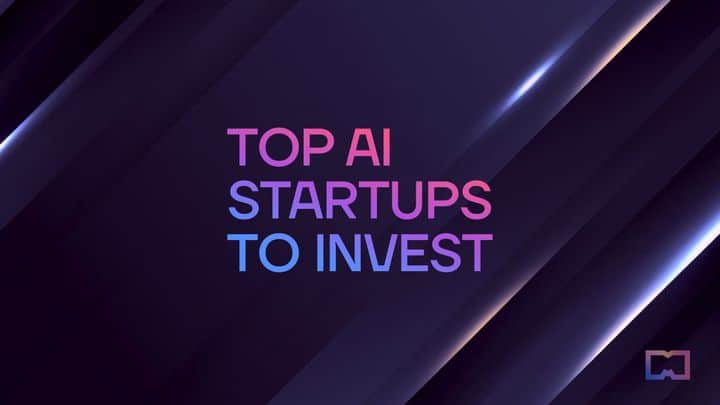Top 20 AI Startups to Invest in 2023


AI has emerged as a transformative force in the fast-paced world of technology. AI is changing how businesses operate, from improving customer experiences to automating complex tasks. For AI startups present exciting opportunities for investors looking to capitalize on this disruptive trend, AI startups present exciting opportunities. This article will delve into the top 20 AI startups to consider investing in for 2023. These startups have been carefully selected based on their market potential, team expertise, technological innovation, and funding history.

| Pro Tips |
|---|
| 1. Explore our curated list of the top 10 AI company stocks to buy under $50 in 2023 and make informed investment decisions today. |
| 2. Whether you’re an entrepreneur or a tech enthusiast, this list provides a range of innovative opportunities to earn money while you sleep. |
| 3. Stay ahead of the investment game and explore our curated list of the top 10 AI company stocks by annual return in 2023. |
Why Invest in AI Startups?
Before we dive into the list of top AI startups, let’s explore why investing in AI startups is a wise choice. AI is longer a niche technology; it has become an integral part of various industries, including healthcare, finance, e-commerce, and more. Here are some compelling reasons to consider AI startups for your investment portfolio:
- Disruptive Innovation: AI startups are at the forefront of innovation, constantly pushing the boundaries of what’s possible. Their solutions have the potential to disrupt traditional industries and create new markets.
- Scalability: AI technologies can scale rapidly, allowing startups to expand their reach and impact. This scalability can lead to exponential growth in a relatively short time.
- High Demand: Businesses across the globe are actively seeking AI solutions to gain a competitive edge. This demand for AI servicestartup revenue potential significant revenue potential for startups.
- Talent Pool: AI startups often attract top talent in the field. The teams behind these startups are composed of experts with deep knowledge and experience in AI and related technologies.
- Diverse Applications: AI has many applications, from natural language processing to computer vision. This diversity means that AI startups can cater to various industries, reducing the risk associated with niche markets.
Now that we understand the potential of AI startups let’s explore the top 20 AI startups to keep an eye on in 2023.
1. Abnormal Security
Industry: Email security
Funding: $74 million1
Overview
Abnormal Security is a cloud-native email security platform that uses behavioral data science and artificial intelligence to stop modern email attacks. The company was founded in 2018 and is based in San Francisco, California. Abnormal Security claims to protect more than 5% of Fortune 1000 companies from email-based cybercrime, such as phishing, business email compromise, supply chain fraud, and ransomware.
Abnormal Security’s platform integrates with cloud email providers, such as Microsoft 365 and Google Workspace, and analyzes each organization’s communication patterns, relationships, and business processes. It then uses machine learning models to detect and block abnormal and malicious emails that can bypass traditional security systems. Abnormal Security also provides visibility and remediation tools for security teams, as well as awareness training for employees.
Abnormal Security’s platform has three main products: inbound email security, outbound email security, and cloud security posture management. Inbound email security protects the organization from external threats like impersonation, credential theft, and malware. Outbound email security protects the organization from internal threats like data loss, account takeover, and misdirected emails. Cloud security posture management helps the organization identify and fix configuration gaps that can expose the cloud email environment to risks.
Pros:
- Uses AI and machine learning to provide accurate and adaptive threat detection
- Offers comprehensive visibility into all email threats
- Integrates with Microsoft Office 365, G Suite, and other email solutions
- Easy to deploy and use
- Provides detailed reporting and analysis of threats
Cons:
- Still a relatively new company, founded in 2018
- Limited third-party validation of capabilities
- Focus specifically on email channels rather than full security suite
2. Adept AI
Industry: Construction
Funding: $10 million1
Overview
Adept AI is a machine learning research and product lab that aims to build general intelligence by enabling creative collaboration between humans and computers. The company was founded in 2022 and is based in San Francisco, California. Adept AI’s mission is to create an AI teammate for everyone that can understand natural language goals and execute them on various software tools.
Adept AI’s main product is ACT-1, a large-scale transformer model that can perform actions on digital tools, such as web browsers, spreadsheets, databases, and APIs. ACT-1 can take plain language commands and turn them into sequences of steps that achieve the desired outcome. For example, ACT-1 can book a flight, create a chart, or send an email based on natural language instructions.
Adept AI has raised $10 million in seed funding from investors such as Andreessen Horowitz, First Round Capital, and Naval Ravikant. The company is currently in stealth mode and plans to launch an alpha version of its product soon. Adept AI is also hiring engineers, researchers, and designers to join its team.
Pros:
- Focus on a niche application of AI in construction safety
- Offers various hardware sensors and software to monitor diverse risks
- Provides useful data analytics and insights for safety improvements
- Integrates AI with existing construction tech stack
- Hardware offerings allow flexible and scalable deployment
Cons:
- Still early stage, raising Series A in 2022
- Unclear market penetration and customer base size
- Relying on continued advancements in computer vision AI
- Hardware-based solutions may present challenges scaling
3. Affectiva
Industry: Emotion recognition
Funding: $62 million
Overview
Affectiva AI is a software company that builds artificial intelligence that can understand human emotions, cognitive states, activities, interactions, and objects by analyzing facial and vocal expressions. The company was founded in 2009 and is based in Boston, Massachusetts. Affectiva AI’s vision is to humanize technology and create positive social impact.
Affectiva AI’s main product is Affectiva Automotive AI, a driver monitoring system that can detect levels of driver impairment caused by physical distraction, mental distraction, drowsiness, and more. Affectiva Automotive AI can also monitor the mood and engagement of passengers and personalize the in-cabin experience accordingly. Affectiva Automotive AI is used by leading automotive OEMs, Tier 1 suppliers, ridesharing providers, and fleet management companies.
Pros:
- Pioneer and established leader in emotion AI space since 2009
- Large dataset with over 9.9 million faces analysed
- Offer wide range of emotion recognition APIs and analytics
- Solutions for multiple verticals including media and automotive
- Strong industry partnerships like with Ipsos for market research
Cons:
- Focus just on facial analysis and not full emotional intelligence
- Questions around accuracy levels and bias in some applications
- Limited transparency around their datasets and models
- Emotion detection AI still maturing as a technology
4. Agora
Industry: Real-time engagement
Funding: $125 million
Overview
Agora.io is a company that enables developers to create engaging and immersive applications that leverage real-time voice and video communication. Agora.io’s platform provides simple, flexible, and powerful APIs that can be integrated into any application, on any device, anywhere in the world.
With Agora.io, developers can build applications that allow users to see, hear, and interact with each other in real-time, such as live streaming, chat, voice/video calls, gaming, education, social media, e-commerce, and more. Agora.io also offers artificial intelligence capabilities that can enhance the user experience, such as noise cancellation, speech recognition, face beautification, and background segmentation.
Pros:
- Strong focus on real-time use cases like gaming and live streaming
- Robust set of APIs and SDKs for major platforms/languages
- Built-in scalability and global infrastructure
- Usage-based pricing model appealing to startups
- Experienced technical team with proven track record
Cons:
- Still small company compared to telecommunications giants
- Quality and capabilities remain unproven vs competitors
- Limited brand recognition and ecosystem compared to rivals
- Narrows scope on just real-time engagement
5. Alation
Industry: Data intelligence
Funding: $217 million
Overview
Alation is a company that provides data intelligence solutions that help organizations discover, understand, and govern their data assets. Alation’s flagship product is a data catalog that uses machine learning to automatically scan, index, and annotate data sources across the enterprise. Alation’s data catalog enables users to search, query, and collaborate on data and manage data quality, privacy, and compliance.
Alation also offers other products that support data governance, data literacy, and cloud migration. Alation was founded in 2012 and is based in Silicon Valley. Alation is recognized as a leader in the data catalog market and has more than 250 customers, including Salesforce, Cisco, and Pfizer. Alation’s mission is to help enterprises create thriving data cultures where anyone can find, understand, and trust data.
Pros:
- Strong capabilities in data discovery and cataloging
- Leverages AI for automated profiling, tagging, searching
- Cloud-native SaaS model for rapid deployment
- Broad use cases across industries and roles
- Established customer base including large enterprises
Cons:
- Still relatively new company, founded in 2012
- Scope limited specifically to data intelligence
- There are open-source alternatives for data cataloging
- Not a full enterprise data platform, partners with some rivals
6. Algolia
Industry: Search-as-a-service
Funding: $315 million
Overview
Algolia is a company that provides hosted search APIs that enable developers to easily add robust search to their websites and applications. Algolia’s search engine uses natural language processing and machine learning to deliver relevant, personalized, and typo-tolerant results.
Algolia’s search APIs are flexible, scalable, and secure, with over 10,000 servers globally that ensure fast and consistent performance. Algolia’s APIs support various languages, platforms, and frameworks, and allow developers to customize every aspect of the search experience, from indexing to ranking to UI design.
Pros:
- Strong core search product with advanced relevance ranking
- Easy to implement and integrate search across apps/sites
- Scalable cloud infrastructure handles large search volumes
- Flexible pricing model good for varied use cases
- Search analytics and controls for search optimization
Cons:
- Core product is just search, not a full customer experience platform
- Limited customization compared to fully custom search engines
- Can get expensive at high subscription tiers
- Some competitors offer more personalized recommendations
7. Amplitude
Industry: Product analytics
Funding: $336 million
Overview
Amplitude is a company that provides product analytics and event tracking platform that helps businesses understand and optimize their user behavior, engagement, and retention. Amplitude’s platform enables product teams to collect, analyze, and act on user data across the entire product lifecycle, from acquisition to activation to retention.
Amplitude’s platform consists of three main components: Amplitude Analytics, Amplitude Experiment, and Amplitude Recommend. Amplitude Analytics is a tool that allows product teams to track, measure, and visualize user behavior, segment users, and identify key insights and opportunities. Amplitude Experiment is a tool that allows product teams to run A/B tests and feature flags to optimize user experience and outcomes. Amplitude Recommend is a tool that allows product teams to deliver personalized recommendations and experiences to users based on their behavior and preferences.
Pros:
- Powerful analytics optimized specifically for digital products
- Allows granular analysis of features and user segments
- Infrastructure handles large data volumes from complex products
- Pre-built integrations with many data sources
- Intuitive interface tailored to product teams
Cons:
- Focus just on product usage limits scope of analytics
- Can require significant implementation effort
- Limited flexibility to customize analytics
- Pricing tiers get expensive for enterprise scale
8. Anyscale
Industry: Distributed computing
Funding: $60 million
Overview
Anyscale is a company that provides a cloud platform and developer tools for running Python, machine learning, and analytics workloads at scale. Anyscale’s platform is based on Ray, an open source project that enables distributed computing and AI applications.
Anyscale’s platform consists of three main components: Anyscale Development, Anyscale Production, and Anyscale Academy. Anyscale Development is a tool that allows developers to build, test, and debug scalable AI and Python applications on Ray using their own IDEs and frameworks. Anyscale Production is a tool that allows developers to deploy, manage, and monitor scalable AI and Python applications on Ray using their own cloud providers. Anyscale Academy is a tool that provides online courses, tutorials, and community support for learning Ray and Anyscale.
Pros:
- Optimized architecture for scaling Python & machine learning
- Automates cluster management and deployment
- Flexible use of both on-prem and cloud infrastructure
- Built on open source Ray project with large community
- Free tier makes it easy to get started
Cons:
- Still early stage, raising Series B in 2021
- Small company compared to major cloud providers
- Limited documentation and support resources
- Python-centric, lacks support for other languages
9. AppZen
Industry: Expense auditing
Funding: $136 million
Overview
AppZen is a company that provides automated expense auditing using AI. Their platform analyzes expense reports, credit card charges, and invoices to detect compliance issues, fraud, or money leakage. AppZen’s platform helps finance teams to reduce costs, increase efficiency, and improve accuracy.
AppZen’s platform consists of two main products: AppZen Expense Audit and AppZen Autonomous AP. AppZen Expense Audit is a tool that allows finance teams to customize their expense policies and streamline their enforcement. AppZen Expense Audit uses deep learning, semantic analysis, and computer vision to review every expense claim and receipt in real time, flagging any violations, duplicates, or anomalies. AppZen Expense Audit also enables faster reimbursements and better employee satisfaction.
Pros:
- AI handles time-consuming manual expense auditing
- Flexible supporting various expense data sources
- Offers real-time as well as periodic auditing
- Custom anomaly detection tailored to company
- Integrates with reporting and analytics
Cons:
- Expense auditing is a narrow focus area
- Suggests but doesn’t decisively approve expenses
- Requires large volumes of data to fully train AI
- Up against larger corporate expense solutions
10. Aurora Innovation
Industry: Self-driving vehicles
Funding: $1 billion
Overview
Aurora Innovation is a company that is developing self-driving vehicle technology including hardware, software, and data services. Their systems can support level 4 autonomous driving across multiple vehicle types, such as passenger cars, trucks, and delivery vans.
Aurora Innovation’s technology is based on the Aurora Driver, a computer system that can be integrated into cars for autonomous driving. The Aurora Driver consists of three main components: Aurora Vision, Aurora Radar, and Aurora Command. Aurora Vision is a sensor suite that uses cameras, lidar, and ultrasonic sensors to perceive the environment. Aurora Radar is a long-range radar system that detects objects and their velocities. Aurora Command is a software platform that plans the optimal path and controls the vehicle’s actions.
Pros:
- One of the market leaders in autonomous vehicle tech
- Taking an integrated, full-stack approach to self-driving
- Partnerships with top automotive OEMs and suppliers
- Talented team with experience across AI, automotive, and big tech
- Publicly-traded company with access to capital
Cons:
- Technology still under development with unclear timeline
- Highly capital intensive field, faces major competition
- Significant regulatory and adoption uncertainties
- Liability and safety risks remain unresolved
11. Brex
Industry: Business banking
Funding: $1.2 billion
Overview
Brex is a company that is reinventing B2B banking by offering corporate cards and spend management software designed specifically for startups and high-growth companies. Brex uses real-time underwriting and AI/ML to offer instant approvals, higher limits, and tailored rewards.
Brex’s products include Brex Card, Brex Cash, Brex Premium, and Brex Global. Brex Card is a business charge card that does not require a personal guarantee or credit check. Brex Cash is a cash management account that pays interest and has no fees. Brex Premium is a subscription service that provides advanced features and benefits. Brex Global is a solution that supports global spending and multinational operations with local-currency cards, local billing, and locally funded reimbursements.
Pros:
- Modern banking tailored to tech/growth company needs
- Real-time approvals and high limits suit frequent spending
- Good rewards program optimized for travel and ads
- Integrates with accounting, CRM, and expense platforms
- Relatively low fees and straightforward pricing
Cons:
- Only supports basic banking features, not complete replacement
- Underwriting relies on linking other business accounts
- Reported customer service issues as company has scaled
- Higher fraud liability burden compared to personal cards
12. C3.ai
Industry: Enterprise AI platform
Funding: $228 million
Overview
C3.ai is a company that offers a platform to help organizations develop, deploy, and operate enterprise AI applications. Their software helps manage full lifecycle AI development while handling scale and security.
C3.ai’s platform consists of three main components: C3 AI Suite, C3 AI Applications, and C3 AI Ex Machina. C3 AI Suite is a tool that allows developers to design, build, and run AI applications using a model-driven architecture and a low-code environment. C3 AI Applications are pre-built solutions that address specific business problems in various domains, such as manufacturing, energy, healthcare, and finance. C3 AI Ex Machina is a tool that enables analysts and business users to create and execute AI workflows without coding.
Pros:
- Comprehensive suite covering full AI application lifecycle
- Model explainability and bias detection features
- Support for rapid prototyping and model experimentation
- Integrates with common data sources and IT infrastructure
- Expert team with long background in enterprise software
Cons:
- Relatively complex and expensive platform
- Best suited for large organizations with resources
- Limited pretrained models and BYO model capabilities
- Faces competition from major cloud vendors’ AI offerings
13. Cape Privacy
Industry: Encrypted learning
Funding: $20 million
Overview
Cape Privacy is a company that has developed Enclave, an encrypted learning platform that allows organizations to collaborate on sensitive data sets without exposing raw data. Their cryptographic techniques enable privacy-preserving data analysis.
Enclave is a cloud-based platform that leverages secure multi-party computation (SMPC) and homomorphic encryption (HE) to enable data owners and data consumers to perform joint computations on encrypted data. Enclave allows users to define policies, workflows, and algorithms for data collaboration, and ensures that only the desired outputs are revealed. Enclave also provides audit trails, access controls, and compliance reports.
Pros:
- Novel privacy-enhancing approach to encrypted AI/ML
- Allows unlocking insights from sensitive data
- Could expand collaborative opportunities for data sharing
- Led by respected team of cryptographers
- Early customer traction and pilot projects underway
Cons:
- Small seed stage company founded in 2021
- Validating real-world benefits and scalability
- Limited documentation available publicly so far
- Emerging field of privacy-enhancing AI has challenges
- Competes against open-source alternatives
14. Casetext
Industry: Legal research
Funding: $48 million
Overview
Casetext is a company that offers AI-powered legal research to help lawyers find relevant case law and regulations faster. Their CARA platform combines ML, NLP, and crowdsourcing to improve legal search.
CARA is a cloud-based platform that allows lawyers to upload a legal document, such as a brief or a complaint, and get a list of relevant authorities that may have been missed. CARA uses ML and NLP to analyze the document’s arguments, facts, and citations, and match them with the most authoritative sources from Casetext’s database of over 10 million cases, statutes, and regulations. CARA also leverages crowdsourcing to incorporate insights from other lawyers who have used the platform.
Pros:
- Novel application of AI to streamline legal research
- Continuously training ML models using legal community feedback
- Integrates public and proprietary data sources
- Attorney-specific features like memo drafting
- Freemium model good for user acquisition
Cons:
- Still validates capability vs. incumbent legal research
- Focus just on search vs. full legal suite
- Adoption limited by industry barriers to change
- Revenue and growth still to be demonstrated
- Privacy concerns around legal data
15. Celonis
Industry: Process mining
Funding: $1 billion
Overview
Celonis is a company that offers process mining software that uses AI to analyze operational process workflows and identify inefficiencies. Their platform integrates data from across enterprise systems. Celonis’s software is based on the Celonis Execution Management System (EMS), a cloud-based platform that enables organizations to optimize their execution capacity.
The Celonis EMS consists of four main components: Celonis Studio, Celonis Snap, Celonis Core, and Celonis Solutions. Celonis Studio is a tool that allows users to create custom applications and dashboards. Celonis Snap is a free version of the platform for small teams and individuals. Celonis Core is the engine that extracts, transforms, and analyzes data from various sources. Celonis Solutions are pre-built applications that address specific use cases in finance, supply chain, customer service, and sales domains.
Pros:
- Rapidly growing company and category leader
- Powerful process intelligence capabilities
- Capable of handling complex enterprise datasets and systems
- Valuable insights to optimize workflows and transform operations
- Trusted by large global customers and partners
Cons:
- Very complex and expensive solution requiring long implementation
- Focus just on process mining is more niche
- Competes with general analytics and BI platforms
- Limited flexibility to customize algorithms
- Still needs integration with other data systems
16. Cerebras Systems
Industry: AI chips
Funding: $475 million
Overview
Cerebras is a company that develops high-performance AI compute platforms consisting of specialized hardware, software, and infrastructure. Their Wafer-Scale Engine is designed to accelerate deep learning workloads.
Cerebras’s flagship product is the Cerebras CS-2, a system that contains the Cerebras Wafer-Scale Engine 2 (WSE-2), the largest chip ever built. The WSE-2 has 2.6 trillion transistors and covers more than 46,000 square millimeters of silicon. The WSE-2 can process information more quickly than conventional chips, reducing the training time of neural networks from months to minutes. The CS-2 also includes software tools and libraries that enable users to run various AI applications on the WSE-2.
Pros:
- Novel wafer-scale architecture optimizes for AI workloads
- Designed to minimize latency and data movement
- Swarm communication fabric enables scalability
- Optimized frameworks handle full ML/DL pipeline
- Highly experienced team in HPC and AI hardware
Cons:
- Very high cost limits broad adoption currently
- Unproven benefits vs off-the-shelf GPU clusters at scale
- Limited ecosystem support and tools integration
- Still early technology requiring development
- Long-term viability of custom hardware approach unclear
17. Clearview AI
Industry: Facial Recognition
Funding: $8.6 million
Overview
Clearview AI is a company that provides facial recognition software and database access to law enforcement agencies and private companies. They have scraped billions of images from public websites to power their technology.
Clearview AI’s software is based on a proprietary algorithm that matches faces to a database of more than 20 billion images indexed from the Internet, including social media applications. The software allows users to upload a photo of a person and get a list of possible matches with links to the sources. The software can also work with low-quality images, such as CCTV footage or sketches.
Pros:
- Massive proprietary database enables wide facial recognition
- Already used by hundreds of law enforcement agencies
- Valuable tool for investigative use cases if used ethically
- Raised awareness of privacy concerns with facial data practices
Cons:
- Highly controversial and unethical data practices
- Numerous lawsuits and regulatory investigations
- Concerns over accuracy, bias, and responsible use
- Reputational damage limits commercial viability
- Powerful capabilities open to potential abuse
18. ClimaCell
Industry: Weather intelligence
Funding: $185 million
Overview
ClimaCell is a company that offers global weather forecasting data and analytics to businesses across aviation, on-demand services, energy, and automotive industries. They use AI, IoT, and wireless signals.
ClimaCell’s technology is based on a proprietary platform that collects and analyzes data from various sources, such as satellites, radars, ground sensors, IoT devices, and wireless networks. The platform uses AI and machine learning to create high-resolution, real-time, and hyperlocal weather forecasts and insights. The platform also enables users to create custom alerts, dashboards, and scenarios based on their specific needs.
Pros:
- Novel approach combining data from wireless signals with traditional sources
- Specialized weather insights for business/operational decisions
- Hyper-accurate and real-time weather intelligence
- Flexible delivery via APIs, dashboards, integrations
- High-value offering with proven ROI across industries
Cons:
- Still building global data network and forecasting capabilities
- Focus is a niche vs. broader environmental analytics
- B2B model limits addressable market
- Big cloud providers offer some competing offerings
- Revenue and unit economics not clearly validated
19. Databricks
Industry: Data analytics
Funding: $1.9 billion
Overview
Databricks is a unified analytics platform that combines data warehouses and data lakes into a lakehouse architecture. It is designed for building, deploying, sharing, and maintaining enterprise-grade data, analytics, and AI solutions at scale. The Databricks Lakehouse Platform integrates with cloud storage and security in your cloud account and manages and deploys cloud infrastructure on your behalf.
Databricks provide a collaborative workspace for all your data, analytics, and AI workloads. It offers automated and reliable ETL, open and secure data sharing, lightning-fast performance, ready access to the freshest and most complete data, and the power of Databricks SQL. Databricks also provides solutions that accelerate machine learning across the entire lifecycle. The lakehouse forms the foundation of Databricks Machine Learning – a data-native and collaborative solution for the full machine learning lifecycle from featurization to production. Databricks is used by many companies such as Comcast, Shell, HP, Nielsen, and H&M.
Pros:
- Unified platform optimized for data science workflows
- Built on highly scalable Apache Spark architecture
- Flexible processing of streaming and batch data
- Integrated machine learning lifecycle management
- Support for multiple languages and frameworks
Cons:
- Can have high cloud infrastructure costs at scale
- Challenging for non-data scientists to adopt
- Primarily cloud-based rather than on-prem deployments
- Potential vendor lock-in due to customization
- Steep learning curve relative to basic analytics tools
20. Cognite
Industry: Industrial data ops
Funding: $250 million
Overview
Cognite provides an industrial data operations and contextualization platform for organizations in asset-heavy industries like oil and gas, manufacturing, and utilities. Their solution structures and contextualizes OT/IT data.
Cognite is a company that provides a data operations and contextualization platform for industrial sectors. The company’s main product is Cognite Data Fusion, which uses artificial intelligence to ingest, process, and enrich industrial data from various sources. Cognite Data Fusion enables customers to access and understand complex industrial data in one collaborative workspace.
Pros:
- Optimized for operational data challenges unique to asset-intensive domains
- Advanced data contextualization and data modeling capabilities
- Operationalizes and manages industrial data at scale
- Focus on specific verticals with proven use cases and ROI
- Blue chip customer base including industry leaders
Cons:
- Scalability and usability remains unproven for larger deployments
- Interoperability challenges integrating varied legacy systems
- Ownership changes introduced uncertainty
Comparison Sheet: Top 20 AI Startups to Invest in 2023
| Company | Industry | Key Details |
|---|---|---|
| Abnormal Security | Email security | – AI-powered email threat detection – Comprehensive visibility into attacks – Integrates with email platforms |
| Adept AI | Construction | – Computer vision for construction safety – Wearables, cameras, equipment tracking – Integrates with project management systems |
| Affectiva | Emotion recognition | – Facial expression analysis and emotion AI – Solutions for media, auto, research verticals – Leading emotion detection technology |
| Agora | Real-time engagement | – Powers live streaming, chat, voice/video – SDKs and global infrastructure – Usage-based pricing model |
| Alation | Data intelligence | – ML for data cataloging, discovery, recommendations – Broad use cases across roles and industries – Cloud-native SaaS delivery |
| Algolia | Search-as-a-service | – Hosted search APIs and indexing – Advanced relevance ranking – Easy integration across apps and sites |
| Amplitude | Product analytics | – Analytics for digital product usage and behavior – Powerful cohort and feature analysis – Pre-built integrations with data sources |
| Anyscale | Distributed computing | – Cloud platform for running Python & ML at scale – Automates cluster management – Free tier available |
| AppZen | Expense auditing | – AI analyses expense reports, invoices for issues – Anomaly detection tailored to company – Integrates with reporting and analytics |
| Aurora Innovation | Self-driving vehicles | – Full technology stack for level 4 autonomous driving – Partnerships with top OEMs and suppliers – Publicly-traded with access to capital |
| Brex | Business banking | – Cards, spend management for startups/growth cos. – Real-time approvals and high limits – Good rewards program |
| C3.ai | Enterprise AI platform | – Full application lifecycle platform – Model explainability and bias detection – Rapid prototyping capabilities |
| Cape Privacy | Encrypted learning | – Enables privacy-preserving data analysis – Cryptographic techniques for collaborative AI – Early customer traction |
| Casetext | Legal research | – AI/ML improves legal search and recommendations – Integrates public and proprietary data – Attorney-specific features |
| Celonis | Process mining | – Analyzes workflows and systems to identify inefficiencies – Powerful process intelligence capabilities – Trusted by large global enterprises |
| Cerebras Systems | AI chips | – Specialized hardware optimizes for AI workloads- Minimizes latency and data movement- Early stage technology |
| Clearview AI | Facial recognition | – Scraped images from public websites for database – Used by law enforcement agencies – Highly controversial practices |
| ClimaCell | Weather intelligence | – Combines wireless signals with traditional weather data – Hyper-accurate forecasts for business decisions – Valuable for aviation, energy, auto industries |
| Databricks | Data analytics | – Unified data analytics platform- Built on Apache Spark- Deep integration with machine learning |
| Cognite | Industrial data ops | – Structures and contextualizes industrial OT/IT data – Optimized for asset-heavy domains- Proven use cases and ROI |
Read more about AI:
Disclaimer
In line with the Trust Project guidelines, please note that the information provided on this page is not intended to be and should not be interpreted as legal, tax, investment, financial, or any other form of advice. It is important to only invest what you can afford to lose and to seek independent financial advice if you have any doubts. For further information, we suggest referring to the terms and conditions as well as the help and support pages provided by the issuer or advertiser. MetaversePost is committed to accurate, unbiased reporting, but market conditions are subject to change without notice.
About The Author
Damir is the team leader, product manager, and editor at Metaverse Post, covering topics such as AI/ML, AGI, LLMs, Metaverse, and Web3-related fields. His articles attract a massive audience of over a million users every month. He appears to be an expert with 10 years of experience in SEO and digital marketing. Damir has been mentioned in Mashable, Wired, Cointelegraph, The New Yorker, Inside.com, Entrepreneur, BeInCrypto, and other publications. He travels between the UAE, Turkey, Russia, and the CIS as a digital nomad. Damir earned a bachelor's degree in physics, which he believes has given him the critical thinking skills needed to be successful in the ever-changing landscape of the internet.
More articles

Damir is the team leader, product manager, and editor at Metaverse Post, covering topics such as AI/ML, AGI, LLMs, Metaverse, and Web3-related fields. His articles attract a massive audience of over a million users every month. He appears to be an expert with 10 years of experience in SEO and digital marketing. Damir has been mentioned in Mashable, Wired, Cointelegraph, The New Yorker, Inside.com, Entrepreneur, BeInCrypto, and other publications. He travels between the UAE, Turkey, Russia, and the CIS as a digital nomad. Damir earned a bachelor's degree in physics, which he believes has given him the critical thinking skills needed to be successful in the ever-changing landscape of the internet.


















































